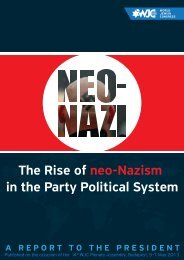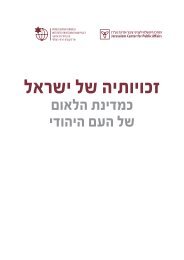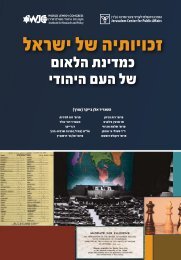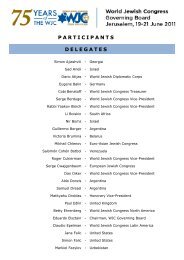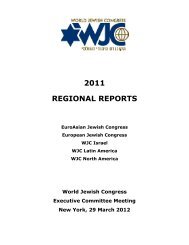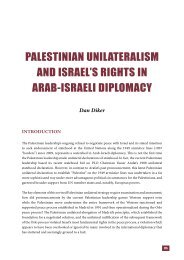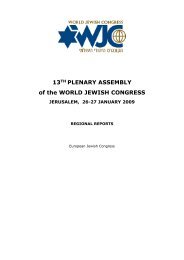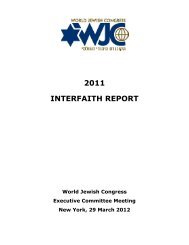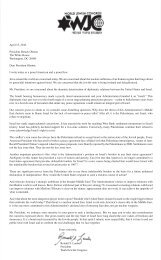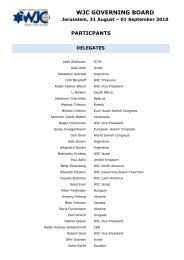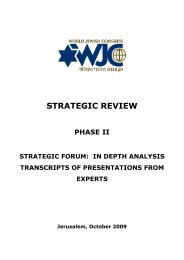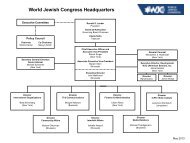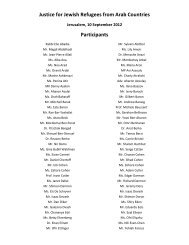Antisemitism Report 2009 - World Jewish Congress
Antisemitism Report 2009 - World Jewish Congress
Antisemitism Report 2009 - World Jewish Congress
Create successful ePaper yourself
Turn your PDF publications into a flip-book with our unique Google optimized e-Paper software.
No. 45, 15 June <strong>2009</strong> / 23 Sivan 5769<br />
Muslim-<strong>Jewish</strong> Relations in Australia: Challenges and Threats<br />
Interview with Jeremy Jones<br />
<br />
<br />
<br />
<br />
There are 350,000-400,000 Muslims in Australia, drawn from many countries with the largest<br />
sources of immigration being Lebanon, Turkey, Afghanistan, Bosnia, Pakistan, and<br />
Indonesia, while just over one-third are Australian-born. There are an estimated 120,000<br />
Jews in Australia.<br />
The integration of Muslims and Jews into the wider Australian population has to be seen in<br />
the context of modern Australia's history as a country of immigration with an ethos of<br />
multiculturalism.<br />
There is a network of interfaith activity in Australia that includes dialogue and collaborative<br />
projects between <strong>Jewish</strong> and Muslim Australians. In some of these there is involvement by<br />
Christian groups and, in a smaller number, by Buddhist, Hindu, Sikh, and Baha'i groups. In<br />
recent years, Australian governments have given support to projects that promote better<br />
understanding of Jews and Judaism among Muslims in Australia and the wider Asia/Pacific<br />
region.<br />
There are many documented examples of anti-<strong>Jewish</strong> propaganda circulated by and among<br />
members of various Muslim communities in Australia. There have also been a small number<br />
of antisemitic incidents of which the victims believed they were perpetrated by Muslims. There<br />
is little firm evidence of this being a widespread phenomenon. Considerable tensions between<br />
the communities arose as a result of Israel's Operation Cast Lead in December 2008 and<br />
January <strong>2009</strong>.<br />
The Religious Mosaic<br />
"There are 350,000-400,000 Muslims in Australia, with one-third of the number born in Australia while<br />
the largest sources of immigration are Lebanon, Turkey, Afghanistan, Bosnia, Pakistan, and<br />
Indonesia, supplemented in recent years by migrants from Africa and the Arab Middle East."[1]<br />
Jeremy Jones, director of international and community affairs of the Australia/Israel & <strong>Jewish</strong> Affairs<br />
Council, is a former president of the Executive Council of Australian Jewry (ECAJ), the electedrepresentative<br />
organization of the Australian <strong>Jewish</strong> community. He is a founding, and continuing, cochair<br />
of the Australia National Dialogue of Christians, Muslims & Jews and represents the ECAJ on<br />
the Australian Partnership of Religious Organizations.<br />
He asserts that "understanding the <strong>Jewish</strong>-Muslim relationship in Australia requires appreciating<br />
some essential features of Australia's history as a country of immigration and the significance of the<br />
culturally diverse community that has developed.<br />
"No single religious denomination is formally established in Australia. Although the major Christian<br />
denominations, Anglicanism and Roman Catholicism, had a sometimes uneasy relationship for much<br />
of the first two centuries of European settlement, there was a cultural understanding that Australian<br />
identity was not related to a particular creed or communion. There has been a <strong>Jewish</strong> presence from<br />
the founding day of the Colony of New South Wales, the first European political entity in Australia. A<br />
number of other non-Christian faiths, including Islam and Buddhism, were present in the colonies that<br />
in 1901 joined to become the Commonwealth of Australia.<br />
"The contemporary religious landscape includes Catholics and Anglicans as the largest<br />
denominations, followed by Orthodox Christians and the Uniting Church of Australia. A number of<br />
other Christian denominations, as well as communities of Muslims, Buddhists, Hindus, Jews, Sikhs,<br />
135



